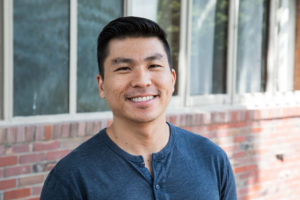 In May’s Web Exclusive, “The Blind Oracle of Mactan,” author Nathan Go takes us to an island in the Philippines, to a fantastical man who just, as it turns out, wants what any of us wants. The prose is light and funny, winding lithely around something that reveals itself to be as profound and enduring a problem as human beings have ever known. Even a human who has lived many, many lifetimes over. We talked with Nathan about how this strange and wonderful story came about.
In May’s Web Exclusive, “The Blind Oracle of Mactan,” author Nathan Go takes us to an island in the Philippines, to a fantastical man who just, as it turns out, wants what any of us wants. The prose is light and funny, winding lithely around something that reveals itself to be as profound and enduring a problem as human beings have ever known. Even a human who has lived many, many lifetimes over. We talked with Nathan about how this strange and wonderful story came about.
Erin McReynolds: The character of the blind oracle is introduced to us in a series of staccato statements, each one almost one-upping the one before it. It reminded me of stories that have grown from exercises—what were the origins of this story? How did he come to you?
Nathan Go: This was a self-imposed exercise—I wanted to challenge myself on telling a full story under 1,000 words. I don’t remember exactly where the idea originated from, but once the masseuse-oracle character was conceived, the story kind of wrote itself. There were just so many fun scenarios I could imagine! One crazy idea followed another. I did not quite succeed in keeping it under 1,000 words (almost), but I felt like it would take away too much from the story if I were to cut it, since it was already so short.
EM: We’ve seen perspective shift in a story before, but this was really more a reveal, which was surprising and delightful. How do you conceive of the unexpected in stories?
NG: By not being too invested in it. This was a fun piece to do, and the most important thing for me was to just have fun, to open any doors that might appear as a result of following the internal logic of the story. I usually work in circles. I seek the answers to the next sentence from what’s already on the page.
EM: People talk about the importance of having total authority when you write, especially about fantastical things. Do you ever struggle for authority, or what’s your approach to it?
NG: I think, it’s a paradox: We ultimately want to be read. But readers don’t like to be coddled. We lose authority every time they feel that the writer is compromising the story in order to satisfy some external need. So instead, by forgetting about the readers, and just embodying the persona of the narrator, we gain authority. Here, in particular, the narrator is God. Can there be a narrator with more authority?
EM: What have you been working on since this story was published?
NG: I’ve been working on the first draft of my novel. I managed to finish a full draft and now I’m just putting it aside to gain some clarity.
EM: Ah, the clarity stage. May I ask how long it took to get a full draft out? And are you a plotter/outliner or a discoverer?
NG: It took me three months to write the full draft, but I was lucky enough to be on fellowship (David TK Wong) the entire time—so I did nothing but read and write. I would like to think of myself as a discoverer. But to be honest, the novel has taken two previous reincarnations to get to where it is. The concept started as a screenplay for my undergraduate cinema major and then turned into a novella with three POVs during my MFA. Now it’s a novel with only one POV. So I guess I’m a discoverer, but a very slow and erratic one.
EM: How much does where you grew up, in Southern Philippines, figure into your work? What interests you most about it, in terms of storytelling?
NG: Where I came from does influence my sensibilities as a person and as a writer. For example, I have a particular kind of humor that doesn’t always translate well to the page. It tends to be self-deprecating, or yet plays with words that Americans might not necessarily consider wordplays. In terms of storytelling, I think I’m still trying to figure out the best way to portray Southern Philippines. It’s not a place that has often been written about. When I was growing up, I didn’t know of any local writers or of any novels set in my city. For me to write about it is a prospect that both terrifies and excites me.
Nathan Go was born and raised in Southern Philippines. His fiction has appeared, or is forthcoming, in Ploughshares, the Bare Life Review, the Massachusetts Review, and the Des Moines Register. A graduate of the Iowa Writers’ Workshop and the Zell Writers’ Program, he was also a 2012 PEN Emerging Voices Fellow and winner of AWP’s 2017 Kurt Brown Prize for fiction. He is the 2017-2018 David TK Wong Fellow at the University of East Anglia.